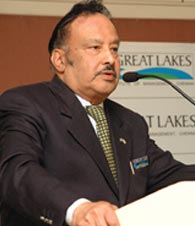|
Executive Interviews: Interview with Bala V Balachandran on Government and Business
December 2009
-
By Dr. Nagendra V Chowdary
-
While the Wall Street thought its
firms to be “too big to fail”, for the
main street “too big to fail” meant a
financial institution cannot be
allowed to fail. Do you agree with
those who say that Lehman had to fail
in order for Congress to have the
political will to pass any kind of
rescue package?
Well, the Titanic was considered
unsinkable. So also, Lehman Bros.
Lehman Bros were allowed to fail
since the policy maker was in the
other camp called ‘competition’. A
select few relish the thought of
watching your competitor drown
without giving him a helping hand.
The truth is ugly, and life is not fair!
-
What did the US Financial Crisis
mean to global economy and the
business? How do you think the
governments and the businesses have
responded?
If you compare China and India,
China believed that they don’t know
advanced finance and financial
investments and trusted their
advisors who are from the US firms.
Thus, the thinking here is that if the
US is doing something, it has to be
right and let us also follow suit and
invest. This is something like the
Venture Capitalist in the Dot Com
Word before it became a Dot, invested
since the super Venture Capitalist is
putting the money. He must be right
and now let us go like a sheep. India,
had its handful fighting fires at home
and hence the inaction helped them
and that is why our economy was not
very affected.
-
What can be the lessons learnt
from this crisis – for governments
and businesses – especially from the
point of view of public policy,
globalization, financial coordination
and information sharing? And also
from the viewpoint of developing
countries – especially for the
emerging and BRIC economies – and
developed countries?
Let us look at the history. A 200 plus
million people of the US over 70
years after agricultural revolution,
industrial revolution created so many
great educational institutions and
systems, including World Bank, IMF
and even United Nations where there
was dominance compared to many
others in the total world and the
British Domination was taken over by
the US capitalism. Three things
happened in the last 50 years:
First Deng Xiaoping went to Lee Kuan
Yew and created Shujow park,
Shanghai, Shendgen etc., creating a
huge economic prosperity lasting
about 17 years before 1991.
Second, the economic freedom of
India created by the then PM Shri P V
Narasimha Rao, the current PM Dr.
ManMohan Singh and the present
Home Minsiter PChidambaram.
Then came Gorbachev, who felt the
need for prosperity and eliminated
the Berlin Wall and made possible the
German Unification and Demise of
the Soviet Union and with little help
from Brazil etc.
Together these four countries form the
BRIC economy and have made about
50% and more of the world economy
co-creating wealth for themselves.
Thus the model in the next decade
will be in these people and the US
will still be a formidable market on all
dimensions but not a dominating
market. Thus whoever takes this
opportunity in these four with some
cooperation within the Block of 4 will
create a new capitalism challenging
the US capitalism. I believe it might be
a welcome respite to the world
economy – in that it need be forced to
periodic upheavals mirroring one
large country’s economy alone – i.e.,
the US.
-
Do you think the crisis is behind
us or are we to witness even worse?
The crisis is almost behind us;
excepting for the Credit Card Crisis or
the 3 C’s. If a high school or higher
secondary school student of 12 years
can have 4 credit cards each with a
cap of $800 without any collateral, in
the US alone, and if all the risks are
compounded, you do the math – it’s
another catastrophe waiting to
happen, if the regulatory framework
doesn’t open itself up to this
possibility and proactively counter it.
But, it is yet to be and I am quite
hopeful that it can be thwarted.
-
How has Wall Street changed
during the past year, and what will
these changes mean for the stock
markets and the investors?
There are certain circuit breakers
which have been put in and it is
hoped that the stock-markets will not
reflect a complete depression state. It
is also hoped that these measures will
introduce a level of stability and
prevent drastic highs and lows in the
indices. But the stock market being
what it is, is largely affected by
sentiments and perceptions of people
and stock values of companies can
plummet or sky rocket based on the
market sentiments and reactions to
news about the company, economy or
even politics. All this considered, I
must also add that these circuit
breakers are for known or
anticipatory problems. There are
very imaginative culprits who can
outsmart any system. The only way
to prevent these is through moral
leadership and honesty, integrity and
transparency.
|
